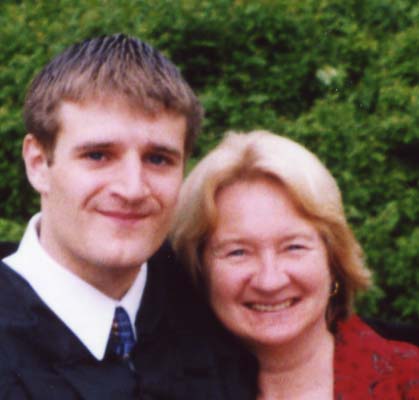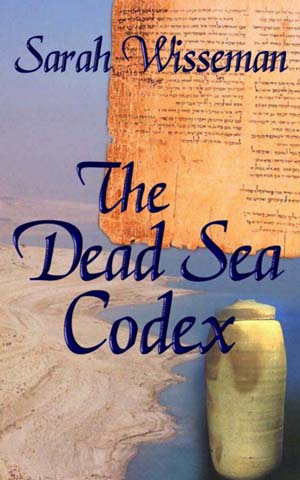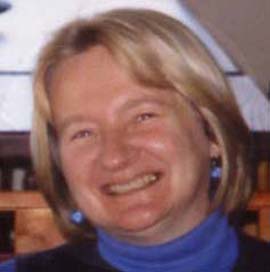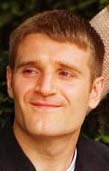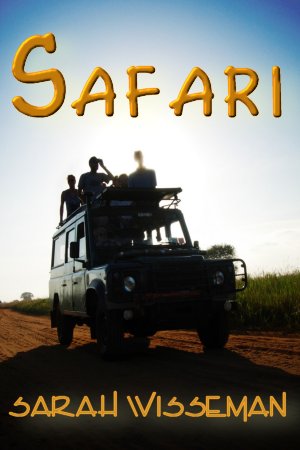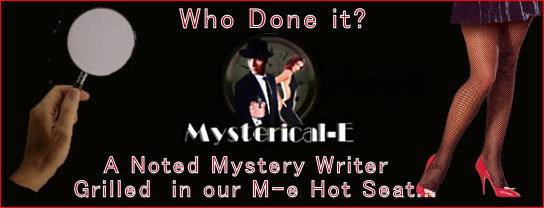 |
A Mother and Son Who Share A Bond in Writing
Tom Underhill, a.k.a Nicholas Wisseman and author of Charted Waters in this issue, is the son of Sarah Underhill Wisseman , author of Justice (summer 2007 issue). Nick chose his penname to honor his deceased grandfather, Thomas Westlake Underhill . What started you in writing? (Was it always a dream of yours?) Did anyone in your family influence you? Sarah: The urge to write is what my father would call a “hereditary taint.” Dad had it: he wrote two unpublished mysteries before his death. After I found his folder of rejections from major publishers and agents (including the priceless “Your prose is as flat as the state of Kansas …”), I decide to self-publish his second book, The Cambridge Caper , in his memory.
I have it: I've written poetry and kept sporadic journals in between long stints as an academic (archaeologist and museum curator) and raising kids. I grew up in a house full of books, everything from Rex Stout and Dorothy Sayers to U.S. history, Edward Gorey, and collected New Yorker cartoons. Both parents read to us, not only when we were little, but also when we were teenagers—wonderful stories like Kipling's The Jungle Book and Arthur Conan Doyle's The Hound of the Baskervilles. My own fiction writing took off when I was preparing the manuscript for a non-fiction book on our University of Illinois mummy investigation, published as The Virtual Mummy ( University of Illinois Press ). The companion novel, Bound for Eternity , was inspired both by the creepy old attic museum where I used to work, and my desire to “finish” the story—to find out more about our little mummy and the person inside the wrappings than we were allowed to do in real life. And now Nick has it. He's been writing stories since elementary school. His first published story (in the Illinios English Bulletin 1991) was a one-page historical piece called “A Day with Tonti and LaSalle.” Nick: Stupid genes. But my Mom certainly didn't do anything to try and cure me of the “taint.” I remember her reading me a variety of things when I was a kid, everything from Curious George to Greek mythology…I blame her. But in all seriousness, she's been hands-down the most influential figure in my life in terms of writing, both fiction and nonfiction. I followed her lead in heading down the humanities path, and I've been asking her advice on the publishing world ever since I finally realized I needed creative writing to be a part of my identity. Sarah : The influence goes both ways— I often ask Nick to critique my manuscripts; he always has insightful and useful comments.
What is your approach to writing a novel: that is, do you outline or not? Do you keep files and piles of notes? Nick : I'm glad this question asks about writing a novel singular: I'm still working on my first, so I really can't speak to writing novels plural. But so far, I do tend to make pretty heavy use of notes and outlines. Or at least I do now: about a quarter of the way in, I realized I couldn't free-flow my story any further without some structure. So I went back, consolidated the various notes I'd scribbled up at one point or another, and made a master outline organized by chapters. Now I actually know where I'm going and where I've been, and it's easy to flesh out each chapter in more detail as I come to it. It doesn't always feel like as organic as it did before, but I do think my writing is stronger for it. Sarah : I do keep different files on my computer (a synopsis, which keeps changing as the manuscript evolves; character descriptions; timeline; background research, etc.). Printouts of these are kept in a three-ring binder, along with hand-drawn maps of buildings and cities I'm writing about. When I want to clarify plot flow, I make a chart on the wall (on a white board my husband originally mounted for toddlers to scribble on with markers), sort of like an EKG with spikes for key events: “first body,” “second body,” etc. What are some of the tricks, pitfalls, etc. that you need to keep in mind when writing a mystery novel/story? Sarah : I think it's important to balance a well-formulated idea of where the story is going with an open mind. I begin writing a scene according to plan, but allow myself to stray from my plan if a new idea or a better way presents itself while I'm actually putting down the words. To some extent, any kind of writing involves this process, but fiction allows you to ask, “what if I changed my mind and did it this way?” without inconvenient truths (facts and footnotes!) getting in the way. On the other hand, one of my difficulties is consistency. Since my university job prevents me from writing every day, I have to reread and check my own work frequently. Nick: Making sure any confusion you create is meaningful…rather than just confusing. I had a creative writing teacher tell me this once, and it's a great guideline to remember when you're trying to turn chaos into suspense. Sarah : I like that—I confuse myself all the time.
Nick : It totally depends. I know there's nothing original or earth-shattering about saying that, but I've had ideas sparked by everything from reading a good book to watching a bad movie to (truthfully) having a crazy dream. If I had to pin it down, though, I'd say I'm most likely to get the impulse from exposure to someone else's creativity. Experiencing something interesting or unique sometimes gets me off on my own mental tangents…and then if I'm lucky I end up somewhere else with a half decent idea that has the potential to be more. But in terms of the form that takes, it's usually a situation. Some device or setting that sets up a workable dynamic. The result, however, is often that my characters come second, which definitely isn't ideal: in the past I think I've focused too much on plot and not enough on people. Again, there's nothing new about saying there's a balance you have to strike…but saying and hearing it is very different from doing it. Sarah : I agree. It could be a newspaper story, or a conversation with my husband over dinner. But there are triggers, such as a bad experience at work that leads to daydreams about murder…not that I'd actually do it, of course, but writing about it is very therapeutic! Or a setting, such as the fabulous site of Karnak , Egypt . A visit there in 2005 inspired me to begin writing an archaeological mystery set in Egypt . My husband suggested adding “a little bioterrorism,” so the premise behind The House of the Sphinx is that a group of terrorists decide to infect Western tourists with smallpox.
What keeps you writing? What inspires you? Sarah: When real life gets crazy, it's wonderful to be able to create a better world on paper. Inspiration comes from turning points in life—one of mine was my junior year in Israel , which got me hooked on archaeology and eventually led me to write The Dead Sea Codex . Another turning point was the trip I took with my husband to East Africa seven years ago. A freak accident of our safari vehicle landed Charlie in hospital with eight broken ribs and a punctured lung. That was bad enough, but what really brought both of us up short was the fact that the man Charlie had changed places with only that morning was thrown out of the Land Rover and killed. This experience had two unexpected consequences: my husband decided to retire early so he could make mixed media art, and I decided to get serious about fiction writing. Several years later, I wrote the short story Safari . Nick: This isn't nearly as deep, but for me it's the act itself. It took me awhile to figure that out, but now I know that mucking around with words is what really makes me happy. A lot of times it doesn't even matter what the content is; high fiction or low copy writing, it's still all rhetoric…which makes it all good.
Sarah: I think I'm better now than I was five years ago about switching hats between academic and fiction writer—I have to dump long-standing habits like long sentences and academic jargon when writing a mystery. Nick: I still feel infected by academia. Once those “therefores,” “moreovers,” and “problematics” get into your bloodstream, they're hard to shake…What I really think I've improved on, though, is my characterization. I know I mentioned it as a weakness before, but writing a novel has definitely helped me; it's too easy for me to fall into caricaturing with short stories. A longer work makes you really develop your protagonists…even if this book does nothing else for me, it was worth the effort for that alone.
What are the three most important pieces of advice you'd give to writers?Sarah: Read widely, both inside and outside of your chosen genre, write as often as you can, and keep an open mind about different ways of being published (print, electronic, audio, etc.) Nick: Don't be afraid to actually put pen to paper. I know that's only one piece of advice, but for me, at least, it's pretty important. Writing in journal format first feels a lot more freeing than word processing, even if I'm following a very detailed outline. It's harder to agonize over very word when I can't cut, paste, or delete, so I end up getting that all-important first draft out a lot faster. Then I have something solid to hack to bits on the computer. It's also strangely satisfying to do something you love a little impractically.
What's the most difficult stage in the writing for you?Nick: Getting my fingers typing (or scribbling if I'm working by hand). Once I actually buckle down, there's no problem. It's just not initially giving in to web browsing or channel flipping that presents the challenge. Sarah : Carving out the time. Once I'm started, I can usually make some progress. When I get stuck, a long walk helps get my brain in gear and often sparks new ideas.
Who are the authors who you admire most, who inspire you, whose writing you think is most beautiful, moving, exciting? Nick : J.R.R. Tolkein and Gore Vidal are my old standbys, but recently I've gotten into Jacquelyn Carey and Patrick O'Brian. They're both excellent writers in very different ways: Carey's lush and sumptuous, and O'Brian's a master of bringing history to life. Sarah : Josephine Tey for first-class mysteries superbly written; Mary Stewart for romantic suspense; Ellis Peters and Steven Saylor for wonderful historical mysteries; Richard Preston ( The Hot Zone) for absolutely riveting non-fiction; Robert Frost for poetry that I discovered in high school and still love.
What do you find most satisfying in a book: a great plot, beautiful writing, fully realized characters? Sarah: A compelling story, one that pulls me out of my everyday world. Nick: I'm pretty choosy: I like the combination of all three.
What other kinds of writing do you do?Nick: My day job involves writing for a consulting firm. Which sounds pretty dry, but we actually help companies turn their training programs into the equivalents of online video games. My role is to write content for these “learning modules,” which, because they stress role-playing and simulation, involves writing scripts composed of both fiction and nonfiction. It's not Hollywood , but it's not bad, either. Sarah: Technical articles and monographs on archaeological science, ceramic technology, and mummies. There's a link to my “day job” on my writing website: www.sarahwisseman.com
What are your goals as a writer? Sarah: To keep at it, improve my craft, and try new things. I'm currently researching my first historical mystery (that must be Nick's influence!). Nick: To have my name included in someone's answer to “Who are the authors who inspire you?” …and to pass on the “taint.” |
|
|
Past issues and stories
pre 2005.
Subscribe to our mailing
list for announcements.
Submit your work.
Advertise with us.
Contact us.
Forums, blogs, fan clubs,
and more.
About Mysterical-E.
Listen online or download
to go.
|
|
|
 |
 |


